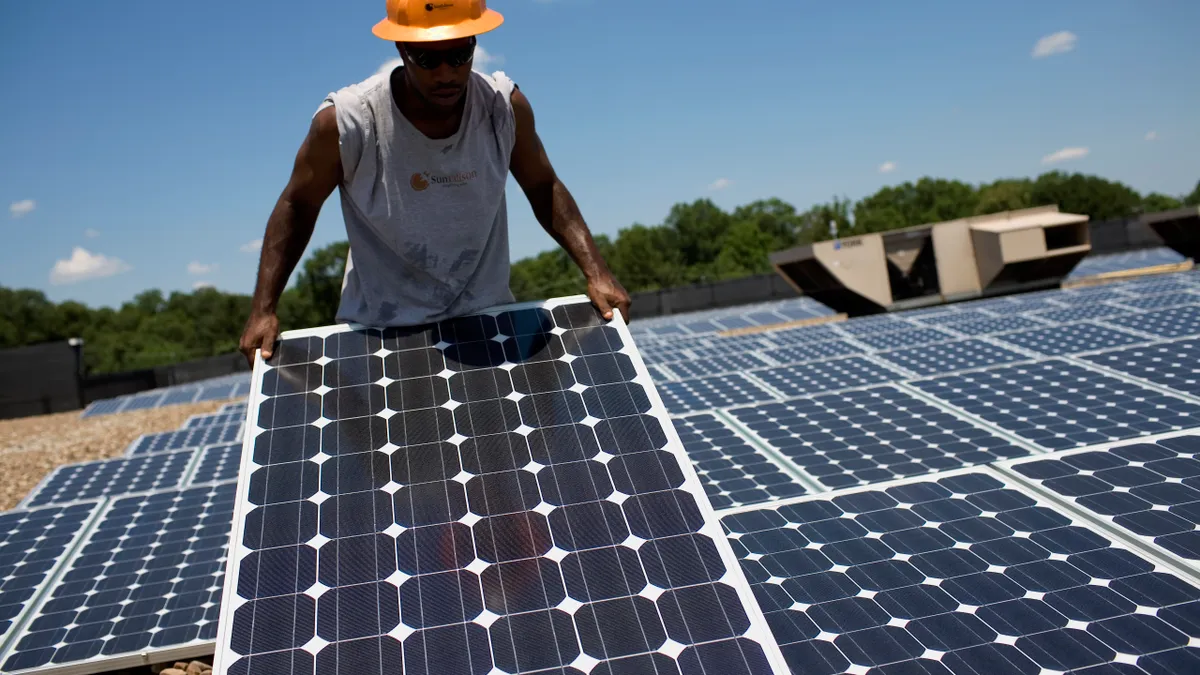Dive Brief:
- The U.S. Department of Energy's (DOE) National Renewable Energy Laboratory (NREL) is set to release an online solar permitting platform, called Solar Automated Permit Processing Plus or SolarAPP+, beginning May 12.
- SolarAPP+, funded jointly by DOE and a collection of industry partners, will enable contractors to secure permits for residential installations almost instantaneously in up to 80% of U.S. communities. Pilot communities including Pima County, Ariz., are already running more than 200 applications a month through the app.
- NREL officials say they intend to continue to update the app with new features, such as permitting for storage systems, to be released quarterly through 2023. Long-term, management of the app will transition to an independent nonprofit.
Dive Insight:
NREL is set to release the fruits of a multi-year, $1.8 million effort to automate the solar permitting process this month.
SolarAPP+, developed by NREL with funding from DOE and a group of industry partners including Tesla, SunPower and Sunrun, will provide solar contractors nationwide with a standardized, automated permitting process for residential installations, according to Jeff Cook, a renewable energy policy and market analyst for NREL and project lead for SolarAPP+. The app is capable of not only accepting and processing applications, but can also check those applications for errors and regulatory compliance.
In jurisdictions that choose to fully implement the software, the app can automatically approve permits, potentially shaving the permitting process down from an average of two weeks, down to a matter of days or even minutes, Cook said.
Some large cities with fast-growing solar markets have already made automated solar permitting available, and this trend has accelerated during COVID-19, Cook said. But the development costs associated with creating such a platform were prohibitive for communities with smaller budgets. He estimated that solar permitting delays cost U.S. ratepayers roughly $5 million per day. NREL began assembling partners to develop an automated permitting platform in 2018 to streamline the permitting process nationwide.
SolarAPP+ will help to accelerate solar deployment in the U.S, Cook said. He pointed to San Jose, California, which he said experienced a six-fold increase in solar installations after adopting an online permitting system.
Amber D'Ottavio, vice president of product management at Accela, said she has seen SolarAPP+ shrink permitting processes from as long as eight weeks, down to a day or two in cities participating in the pilot. Accela produces software that supports government functions such as building permits and inspections, and is integrating SolarAPP+ into their own processes.
"Pima County, Arizona, specifically is processing 250 applications a month through the app," D'Ottavio said.
Communities have typically opted to have the SolarAPP+ applications checked manually following the initial adoption of the app, D'Ottavio said, but she expected that with time more communities would switch to fully automated approval as they come to trust the app's accuracy.
Currently, SolarAPP+ is capable of processing — and potentially automatically approving — residential solar permits in communities that use the 2017 edition of the National Electrical Code. That should represent 80% of today's market when the app launches this summer, Cook said. The app's website will go live on May 12 with a list of jurisdictions where the software is available for use by licensed solar contractors; additional communities may begin adopting SolarAPP+ this June.
Long-term, Cook said, NREL intends to add support for the new 2020 electrical code as well as new features such as permitting for home energy storage systems, virtual inspections, and possibly interconnection applications. NREL also has an expansion for commercial rooftop permits in the works, though Cook said support for utility-scale systems is not currently a priority.
Cook said NREL received $4 million in March from DOE to add additional features and support SolarAPP+ through 2023. Long-term, the app will be transitioned to the ownership of an independent nonprofit, and will be self-funded through application fees, currently set at $25 per approved application.













